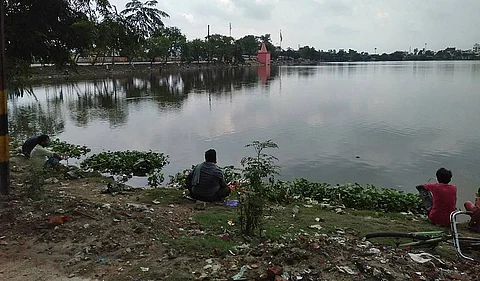

In a positive development for environmental conservation in Bihar’s Darbhanga district, the Bihar State Pollution Control Board (BSPCB) has imposed a fine of Rs 1.61 crore on Darbhanga Railway Station for polluting the Harahi and Dighi ponds.
The board has instructed the Divisional Railway Manager (DRM) of the Samastipur railway division to pay the penalty within 15 days, according to BSPCB officials on February 3.
A BSPCB official stated that the fine was imposed as an environmental compensation for Darbhanga Railway Station’s violation of pollution control standards.
A BSPCB enquiry team had visited Darbhanga last year to assess the environmental damage and its impact on the ponds, following an order from the National Green Tribunal (NGT).
The BSPCB found that the allegations against Darbhanga Railway Station, involving the discharge of untreated sewage into the Harahi and Dighi ponds, were true.
This pollution has not only harmed the ponds but has also threatened aquatic life and the health of the local population that relies on the water.
In August 2024, the NGT confirmed that Darbhanga Railway Station had been discharging untreated sewage into the ponds and directed the BSPCB to determine the fine amount for the environmental damage.
Subsequently, BSPCB issued a notice to Darbhanga Railway Station to pay the Rs 1.61 crore fine and requested railway officials to submit any objections within five days. However, as no response was received, BSPCB has now imposed the fine in compliance with the NGT’s order. The notice also directed the railway station to submit a time-bound action plan for the installation of Sewage Treatment Plants (STPs).
According to the BSPCB notice, the action plan should include the reuse of treated wastewater for purposes such as irrigation (agriculture, horticulture, parks), dust suppression, road cleaning, and washing or cleaning, provided that the treated wastewater meets the standards prescribed by the NGT.
Vinay Srivastav, DRM of the Samastipur East Central Railway Zone, stated that Darbhanga Railway Station has taken steps to halt the discharge of untreated sewage into the nearby ponds. "No longer is the untreated sewage being discharged into the ponds. The relevant officials have confirmed that drains have been closed and the water has been redirected to recycling plants and local urban body drains," he said.
Narayanjee Choudhary, who runs the Talab Bachao Abhiyan (TBA) in Darbhanga and filed a complaint with the NGT against the railway station, told DTE that railway officials had ignored their protests against the sewage discharge and forced them to approach the NGT. "The BSPCB's decision to impose a fine on Darbhanga Railway Station following the NGT’s order is a major victory for us in our efforts to save, conserve, and protect the ponds of Darbhanga," he said.
Choudhary added that the three ponds — Harahi, Dighi, and Ganga Sagar— are located in the heart of Darbhanga and are interconnected. These historical and rare water bodies, stretching 1.8 km from north to south, are divided by two roads at Railway Station Chowk and Donar Chowk.
He also alleged that the powerful land mafia continues to encroach on ponds across Darbhanga and Bihar. This remains a serious concern, particularly given the increasing challenges posed by climate change. He recalled that the NGT had intervened three years ago to protect the three ponds. The NGT’s Eastern Zone Bench in Kolkata had ordered a blanket ban on illegal construction around these ponds. The 900-year-old ponds—Harahi, Dighi, and Ganga Sagar—have long been vital to the local community.
Choudhary further alleged that the land mafia had encroached on multiple ponds in Darbhanga, and authorities were fully aware of these activities. "In the last decade, no one has been held accountable for encroaching on ponds in Darbhanga," he claimed.
According to Choudhary, around 200 of Darbhanga's 350 ponds have been filled in over the last three decades. "Authorities have made no serious effort to save or protect these ponds. Official records indicate that only 100 to 125 ponds remain in Darbhanga town," he said.
The district gazetteer from 1960 states that Darbhanga had 350 ponds, but by the 1990s, this number had dropped to 250. Current data from the district municipality suggests fewer than 100 ponds remain.
Choudhary also criticised the state government’s much-publicised Jal Jeevan Hariyali Mission, which aims to remove encroachments from ponds. "Despite large investments and resources, this mission is only on paper. The Jal Jeevan Hariyali Mission is a good initiative, but it lacks direction on how to preserve or restore ponds," he added.
Ponds in the flood-prone Koshi and Mithilanchal regions of north Bihar are increasingly being encroached upon and filled in to make way for housing, with some being converted into agricultural land. Experts suggest that as land prices rise, government ponds have become easy targets for mafias seeking to profit from them.